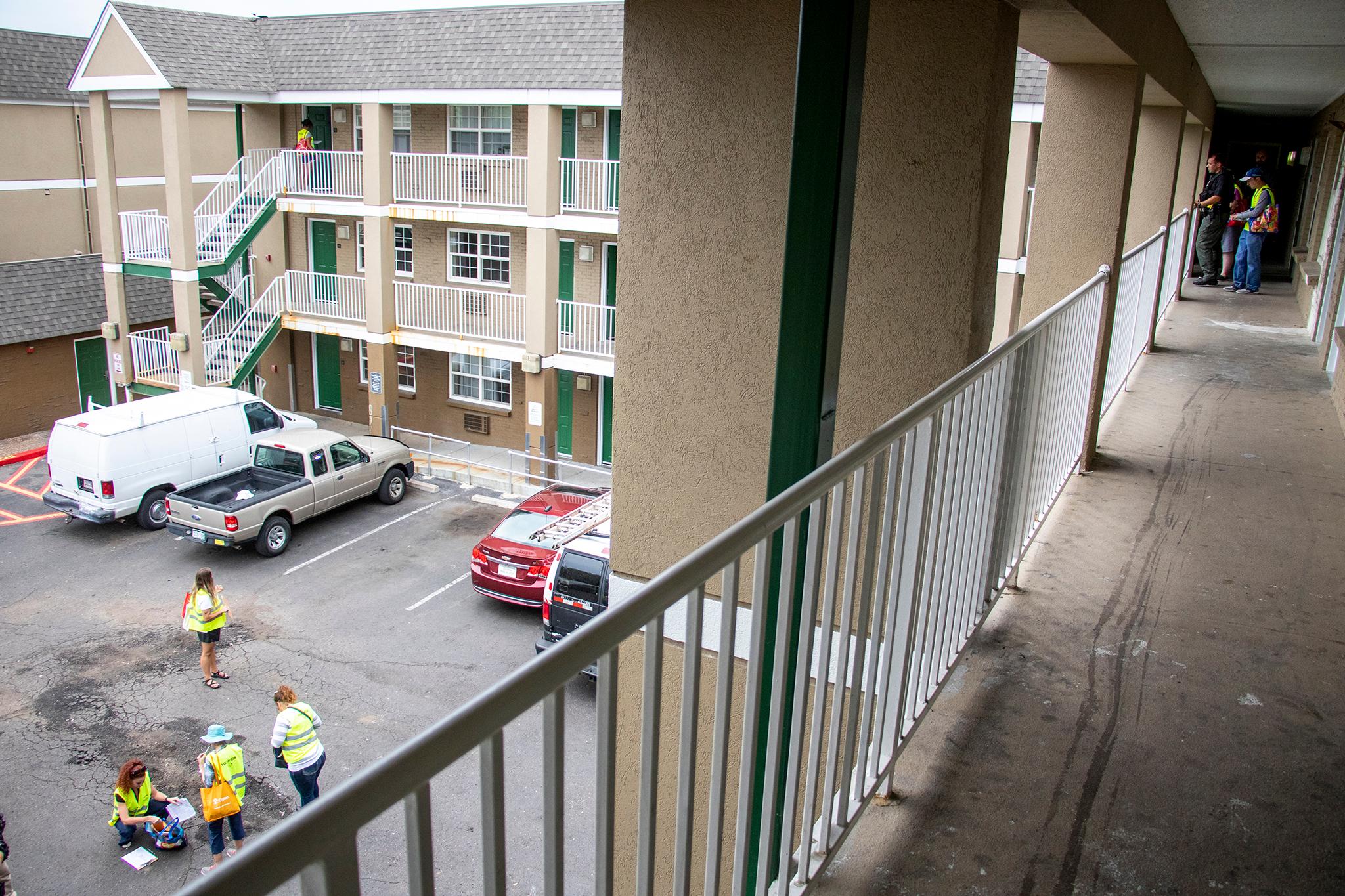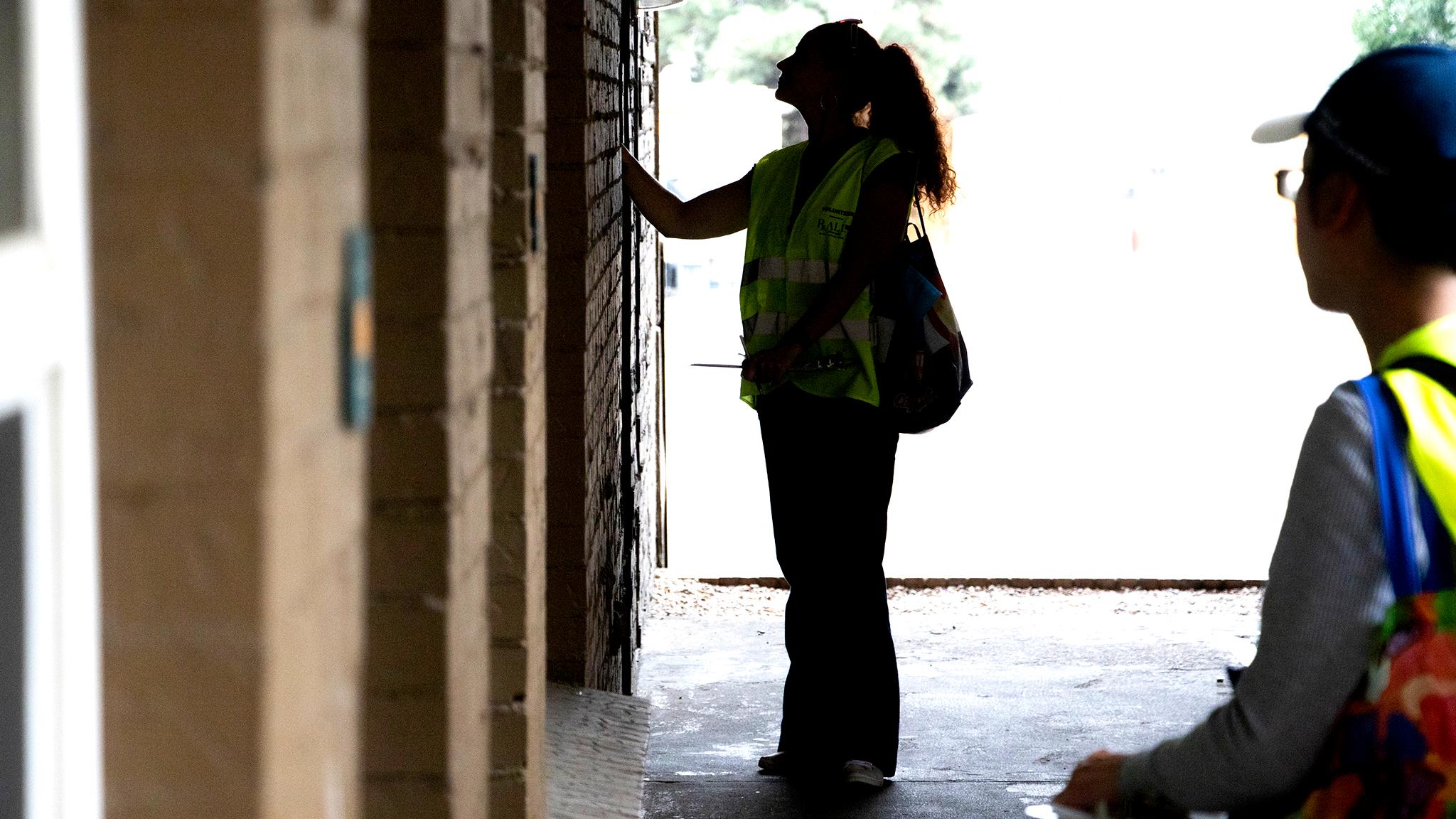During the annual Point in Time survey, a federal standard for assessing homelessness, no one would be knocking on doors at a Lakewood hotel.
Yet volunteers are doing just that in Jefferson County this week as part of an effort to get a better grasp on homelessness in metro Denver.
Motels like the 147-unit HomeTown Studios on Kipling Street near U.S. Route 6 "are our de facto shelters," said Lakewood Police Agent Alan Alden.
Alden and several fellow officers waited in the parking lot as volunteers in yellow vests approached every door at HomeTown, which lists rooms starting at about $80 a night. One knock was answered by a teenage girl who said she and her mother had been doubled up with another family in a Lakewood house until about a week ago. When the landlord discovered the arrangement, they had to go. He said it was a violation of the lease to have so many unrelated adults sharing a home. The teen said her mother was paying for the room, equipped with a small kitchen, with her own money and not with a housing agency voucher.
The teen did not know how long they could afford to stay. As she spoke, she clutched a slim sheet a count volunteer had handed her that listed the phone numbers of food pantries, rental assistance programs, low- or no-cost clinics and other resources.

Jefferson County's count is more thorough and nuanced than the federal government's Point in Time used by Denver and others.
The federal Housing and Urban Development definition of homelessness considers doubling up a form of housing. People who are able to pay for their own hotels are also considered housed by HUD.
But doubling up is not always secure and families often can't long sustain paying for a hotel room on their own. JeffCo organizers wanted to gather information about people in those situations as part of their effort, which they hope will spur policymakers to devote funds to address homelessness in the county.
Agencies that provide housing vouchers feed their numbers to the federal government, so canvassers don't go to hotels and motels because they don't "count" as homeless in the government's eyes.
But JeffCo is counting them. Visits to HomeTown Studios and similar sites were just one of the ways their count differs from the Point in Time.
The Point in Time always take place in January, when the weather often ensures people will seek out shelters, where they are easy to count. Jefferson County has only one shelter that serves a general population, and that haven is open only when weather conditions are severe. Jon Alesch, who heads the Lakewood Police Department's Community Action Team and helped organize the Jefferson count, said people who spend summers in his county's mountain parks are hard to find during the winter. They'll be included in the county count.
As its name suggests, the Point in Time takes place over a limited period -- a 24-hour slot. That yields a snap shot that can be tracked over time and compared from city to city across the United States.The Point in Time also is important because the federal government uses it to make decisions about funding housing program.
Volunteers are spending five full days on the Jefferson County count this week. In addition to surveys collected in the field, hospitals, schools and service providers are putting the same survey questions to people throughout August.
Kate Skarbek, a senior management analyst for Westminster Parks, Recreation and Libraries and another organizer of the Jefferson count, doesn't dispute the Point in Time's usefulness. Jefferson participates in the Point in Time organized by the Metro Denver Homeless Initiative along with six other counties. But Skarbek points out that it can be difficult to get to everyone who is housing insecure in one night in her 774-square-mile county.
Cassie Ratliff, who directs homelessness programs for Family Tree, said people who contacted her nonprofit in August would be surveyed. In addition, she and other Family Tree staff were volunteering for the field survey.
Family Tree has its headquarters in Jefferson and provides housing and other services to clients -- half of whom earn less than $10,000 a year -- in all seven counties where the Metro Denver Homeless Initiative operates.
"County lines are only on a piece of paper," Ratliff said.
When she first heard a separate Jefferson count was being planned, she questioned what it would add to the Point in Time. She came to see it as an opportunity.
"Homelessness can happen to anyone, and we need to identify what it really looks like in our county so we can get funding, so we can get rid of the NIMBYism," she said. "We do have a need."
Results from the Jefferson count are expected to be released in January or February -- it will take time to count the surveys filled out by hand and ensure no one is counted more than once.
The surveys include more thorough questioning than the federal government's count about whether people are receiving food, employment or other services and whether they face transportation, language or other barriers to getting help.
Volunteers this week are approaching people not just at hotels but in mall parking lots and mountain parks, along drainage ditches and scenic creeks, on street corners and in libraries. Law enforcement officers like Alden from jurisdictions across the county were involved in the count in part as guides because in the course of their work they have learned where people experiencing homelessness live.
The count has been an education for law enforcement as well. Mark Barrick, a Jefferson County sheriff's deputy, said he was astonished when he calculated how much families were paying to stay in hotels and motels. In some cases he found it added up to a mortgage payment. But a single mother scraping together enough for a week's stay at HomeTown Studios might struggle to save for a security deposit and first month's rent on an apartment. Or maybe she lacks the kind of credit history that would make buying a home difficult.
The officers also provided reassurance to volunteers who may have been nervous about approaching strangers to talk about housing.
Ana Carell, who was among the volunteers Wednesday and had done outreach work among people experiencing homelessness in other parts of the United States, was initially concerned that the presence of police would unsettle people she was trying to interview. But she soon saw the officers were discreet, she said.

In the HomeTown Studios parking lot Wednesday, the third day of the on-the-ground count, volunteer Tylar Lingar consulted with a Jefferson County Sheriff's deputy about interview techniques. He advised she make eye contact with her subjects and try not to stand over someone who is sitting so as not to talk down to them. Lingar said that's how she tries to approach anyone she meets.
Lingar had heard about the count from her employer, a political researcher. She signed up for five full-day shifts, making her the expert on her team Wednesday afternoon. The two other women on the team had each volunteered for one half-day shift.
Skarbek's goal had been 500 volunteers, as many as are deployed in total for all seven counties during the Metro Denver Homeless Initiative's Point in Time. In the end Skarbek was able to sign up 200 volunteers.
Diane Howald, who leads Point in Time for the the Metro Denver Homeless Initiative, helped Skarbek train volunteers and volunteered herself on Wednesday. Howald said she embraced Jefferson County's effort as a chance to gather more data -- and involve more people. Such surveys, Howald said, are an opportunity for people who know little about homelessness to "meet their neighbors who live on the streets.
"It makes it harder to view homelessness as something experienced by the other."
Carell recently arrived in Denver to set up a local "housing first" study, a strategy of getting people into permanent homes quickly and then addressing health or other issues to ensure they stay housed. She volunteered after hearing about the Jefferson County count from Howald, getting a chance to learn more about how Denver and its neighbors interact.
"You have to see that people living in homelessness are in the same community as you and you can have shared experiences," Carell said.

Lakewood realtor LaDawn Sperling sits on the board of her city's ActionCenter, which provides food and other support for people experiencing homelessness. She once befriended a woman living on the streets and helped her find permanent housing. The woman refused mental health support she clearly needed, and did not remain housed for long, Sperling said.
Sperling is more familiar with homelessness than most people who are housed. But she said her afternoon volunteering with the Jefferson count was nonetheless illuminating.
She started in the parking lot of a Walmart on Wadsworth Boulevard, a part of town she doesn't visit often. Within an hour, Sperling, Lingar and a third volunteer surveyed five people, including a 20-year-old Californian in a battered Dodge sedan who had been in Colorado a month, and an older man sitting under a tree who had grown up in Lakewood.
Steve Lundy, the man under the tree, said he had been experiencing homelessness for more than 20 years.
"I'd like to have permanent housing," he said, saying there was little he could afford.
"There's a problem with that in Jefferson County: You've got to get on a wait list for two, three years."
She learned, Sperling said, "how widespread the problem is."











